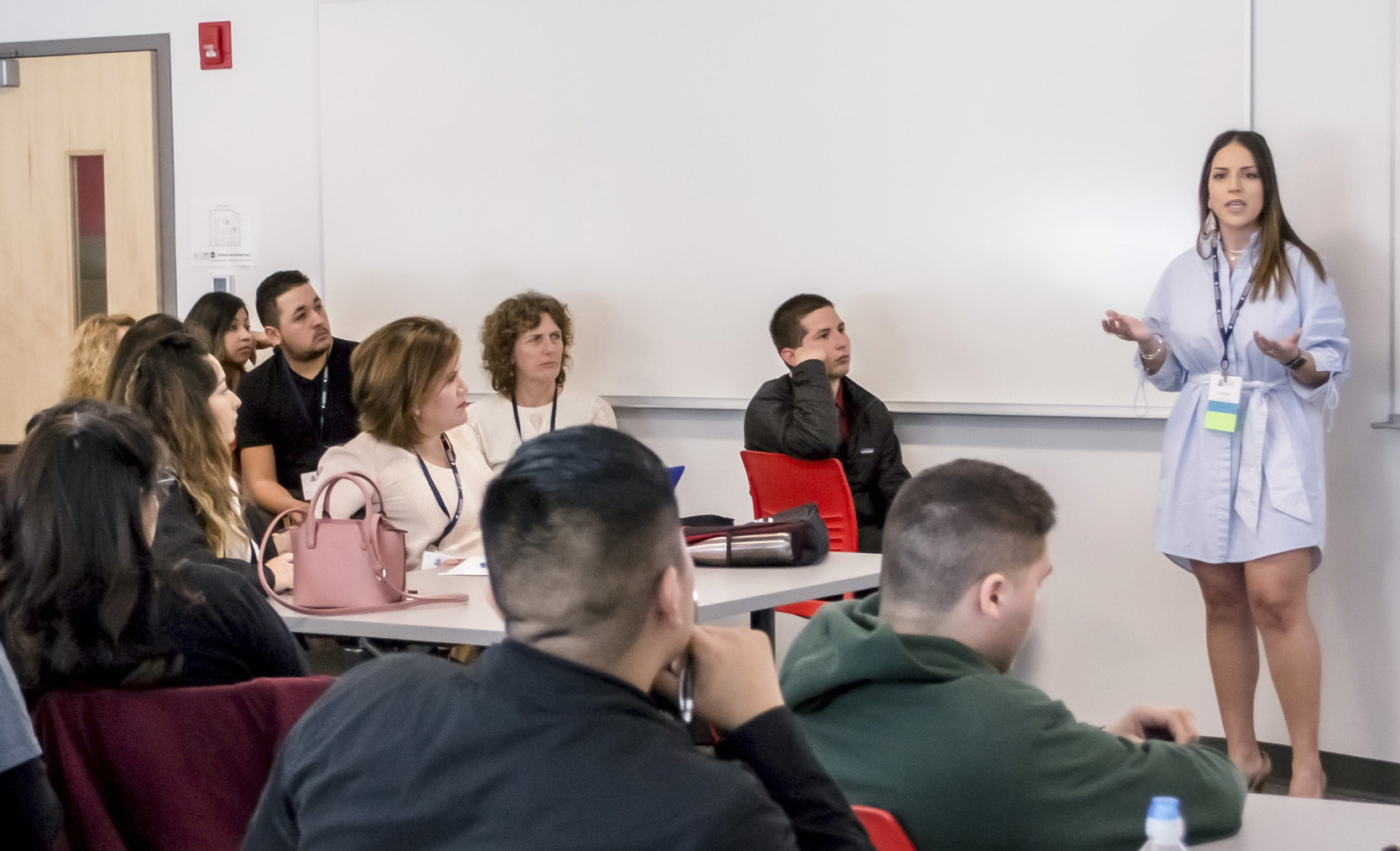
UHCL shares peer mentoring program success at national conference

April 16, 2018
Since fall 2017, University of Houston-Clear Lake has been successfully implementing a peer mentoring program as the integral part of a $3.7 million Hispanic Serving Institution STEM grant titled Pathways to STEM Careers. The grant supports Hispanic and low-income students pursing degrees in all science, technology, engineering and mathematics fields. Program Director for HSI STEM Grant Benito Vasquez, accompanied by Senior Academic Adviser for the College of Education Carmen Conley and three undergraduate students working as paid peer mentors in the program, attended an HSI national conference from March 24-28 in Chicago. They presented a proposal to other colleges nationwide, highlighting the successes and challenges they faced in building the peer mentoring program.
“(Interim Vice President for Academic Affairs) Kathy Matthew is co-principal investigator of the grant, and she, Carmen, and I decided we should present at the Alliance of Hispanic Serving Institution Educators Conference to share the ways we built our peer mentoring program through the perspective of the students who are actually doing the job,” Vasquez said. “It’s not often people at conferences hear the students’ side of things. We built this program from the ground up, and our peer mentors discussed their roles in discovering the specific needs of the students they are working with.”
Conley started the presentation by giving some background information about UHCL and the transitions the university has gone through the last few years; becoming a four-year institution, being designated a Hispanic Serving Institution, and being awarded the HSI STEM grant. “There is definitely a huge need in our community to reach and support Hispanics,” she said. “As an adviser, I witness the many challenges our students face, such as being a first generation college student, working full time, or being head of a household while juggling college. This grant has given us an opportunity to help our students remain in college and support them in order to stay in the STEM fields.”
Vasquez spoke about the process UH-Clear Lake used to train and certify peer mentors, and how the STEM grant propelled UHCL departments in other areas of the university where mentors were also working to collaborate on developing a university-wide peer mentor program. “The question was, ‘How do peer mentors get trained?’ Dr. Matthew discovered some gaps in the consistency of their training across departments and realized we needed to create something comprehensive for everyone,” he said.
“Yolanda Barnes, assistant director of student leadership, involvement, and community engagement, put together information on two different peer mentoring training programs so that the departments involved could choose the one we considered best for UHCL. At the conference, we shared Yolanda’s work so that others could take it back to their own colleges and do the same,” Vasquez said.
Vasquez expressed great pride in the three peer mentors who accompanied him to the conference. “I’m so proud of Andrea Alvarado, Rand Mendez and Daniel Mina,” he said. “I understood the value of their perspective in building this peer mentorship program, but it was wonderful to see their reactions when they realized the audience was captivated by what they had to say about peer mentoring.”
Mendez, a junior majoring in environmental science, said that he shared with the audience his experiences completing the training and ways in which he developed his relationship with his five mentees. “All my mentees are benefiting from this grant,” Mendez said. “I connect with them by meeting with them on campus and we’ve established a comfortable texting relationship. I try to talk a little about how school is going for them. But I’m more interested to talk with them about how they are balancing their lives around school and how they feel their future is changing.”
Alvarado, a senior biology major, said she discussed traditional and non-traditional mentor-mentee relationships in her presentation. “I talked about some of the challenges we face as mentors,” she said. “At UHCL, our university population is a bit different in that our average student age is 27, and many of our students are part-time. Sometimes you’re mentoring in a situation that is unconventional. Perhaps your mentee is older than you and farther along in their degree plan.”
Not all set-ups are perfect, she said, but the important question is to find out how the mentee can best be served.
Mina, a senior computer science major, said that while Alvarado focused on the one-on-one aspect of mentoring, he focused on the impact peer mentors have in the classroom. “I spend time giving my mentees academic help or tutoring,” he said. “I also sit in on a computer science class and offer support as a supplemental instructor. The professor can’t always help each individual student, so I am there to keep students caught up. So, for my presentation, I talked about the impact mentoring has on the academic side.”
Mendez said that his biggest takeaway from the conference was the opportunity to interact with students in other colleges. “Actually talking and collaborating with them was a great experience,” he said. “There was one student I spoke with after our presentation from Sacramento City College who’s also in a peer mentoring program. We have kept in regular touch since the conference. I really feel the students who were hearing our presentation were genuinely interested.”
For Vasquez, the best part of the students’ presentation was at the end, when someone asked if there were any questions. “Every hand in the whole room shot up,” he said. “It showed every person wanted to talk to our students. It was obvious that they had captivated the whole audience. People praised them to me throughout the entire conference.”






